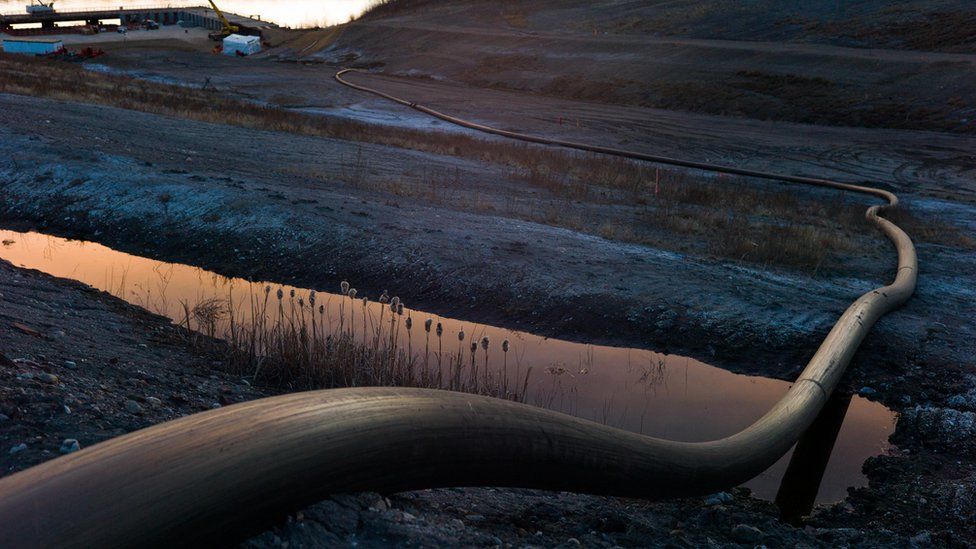Canada's pro-pipeline First Nations
- Published

From pipelines to hydroelectric dams, indigenous Canadians are helping lead the charge against some of the country's largest natural resource development projects. But many First Nations have chosen instead to embrace their hard-fought place in the oil and gas sector.
Joe Dion is from the Cree community of Frog Lake, Alberta, one of Canada's top First Nations oil producers.
There, he heads up Frog Lake Energy Resources Corporation, which is wholly owned by the First Nation and manages the on-reserve oil and gas drilling facilities.
Like most in Canada's energy industry, Mr Dion is pro-pipeline.
"We've got to have these projects, we need oil to tidewater," says Mr Dion.
"We've got to have this access so we can build this country, and this is a time for First Nations to take lead. And we will."
It is a stance that sets Mr Dion and other oil-producing First Nations at odds with the many indigenous Canadians who are helping drive opposition to controversial energy infrastructure projects across the country, from hydroelectric projects in Labrador and British Columbia to Kinder Morgan's contentious Trans Mountain pipeline project.
In September, over 50 Indigenous nations across North America signed on to a treaty alliance opposing all proposed pipeline, tanker and rail projects affecting First Nations land and water. There are now 120 First Nations and tribes signed on.
The tension between the two groups is very real.
On Tuesday, Assembly of First Nations National Chief Perry Bellegarde urged indigenous leaders gathered at a special chiefs assembly to "facilitate a respectful dialogue" on resource development.
"The most important right that we will support is that right to self-determination," he told the audience.
"That means the right to say yes and the right to say no."
Mr Dion is not from the "drill, baby, drill" mould.
Like many in Canada's indigenous community, he supports the Standing Rock Sioux Tribe, who have been leading the months-long protests against the Dakota Access Pipeline in the US.
Mr Dion says projects have to be built in a way that is respectful of affected communities and with the environment in mind, and he understands the US tribe's concerns the project would threaten their water source.
"Water is life. Without water we can't live. I stand with them," he says.
Earlier this year, Frog Lake was one of nine oil producing First Nations that released a First Nations National Energy Strategy.
The document seeks to balance economic interests, the need for government and industry to consult with First Nations, and the recognition that "aboriginal peoples of Canada are the earth's environmental stewards and share this sacred responsibility coast-to-coast-to-coast".
Petroleum-owning reserves are not a rarity in Canada.
The industry employs thousands of Aboriginal people across the country, and some 23,000 indigenous people live in oil sands areas.
Ken Coates, a leading researcher on indigenous affairs with the University of Saskatchewan, says First Nations people won a series of legal battles over the past few decades that have given bands more control of resource development on traditional territories.
"You've got a chance for the first time in Canadian history for First Nations to directly see the benefits of the oil and gas economy," he says.
Reserves are now in the position to seek various deals with companies looking to exploit resources on reserves and traditional hunting, trapping and fishing territories.
Some have. Over the past 15 years, aboriginal-owned companies secured more than CA$5bn ($3.8bn; £3bn) worth of contracts from oil sands developers in the region, according to 2013 government statistics.
Those deals include direct compensation, job training and guaranteed employment agreements, negotiating preferential business contracts, and resource revenue sharing.
Mr Dion says those legal victories can be used to improve economic conditions in aboriginal communities, which have higher rates of poverty, illness and unemployment.
Many reserves also lack proper infrastructure and housing.
"Unless we do something with those wins, turn them into something that will benefit indigenous people in this country, those court wins mean nothing," he says.
Frog Lake has built homes, community and senior centres, and helps fund education programmes with oil production dividends.
Stephen Buffalo, president of the Indian Resource Council, an aboriginal energy advocacy group that represents some 150 reserves, says many First Nations are still learning how to negotiate deals with industry, and industry is learning how to respectfully consult with First Nations on projects.
But he believes the effort will be worth it.
"I hate to see these projects go through and we're still standing there, as First Nations, with nothing. That's my biggest fear," he says.
- Published5 December 2016
- Published4 December 2016
- Published24 November 2016